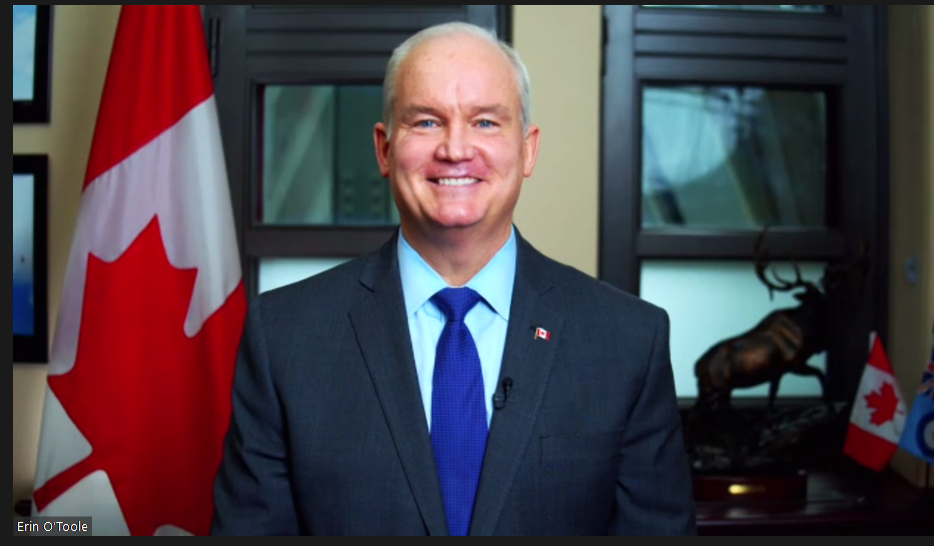The next federal government must focus on getting Canadians in every sector and region across the country back to work, Erin O’Toole told the Oakville Chamber of Commerce on Friday.
The chamber hosted O’Toole, head of the federal Conservative party and leader of the official Opposition, for a wide-ranging virtual question and answer session over lunch.
The Liberals are offering “an economy reimagined by a small group in Ottawa,” said O’Toole, while the Conservative party offers a “steady and certain” path to post-pandemic economy recovery.
“That’s really what the next election, when it comes, will be all about. Who can secure a strong economic future for Canada following COVID-19?”
Although he offered little in the way of specific detail, O’Toole said his plan would leave behind the Liberal’s “misguided ideological approach” to government and help workers across the country get back on the job.
“Canada needs a serious and ethical government focused relentlessly on job creation and a serious economic recovery,” he said.
O’Toole, a Durham MP since 2012, took over as head of the Conservative Party in August.
Pitching himself as a serious, experienced and business-focused leader, he reminded chamber of commerce members of his 12 years of military experience, as well his business experience working as in-house counsel for Procter & Gamble in Canada.
He also emphasized his understanding of southern Ontario’s needs and concerns.
“I’d be the first Prime Minister to represent a GTA riding in history,” he said.
Here’s a selection of his responses to questions from former chamber of commerce chair Tim Caddington:
On helping small business
Describing the protection of small and medium businesses as “a top priority,” O’Toole said his party is developing a Save Small Business package that would “rebalance how we look at bankruptcy, insolvency and the restructuring of businesses.”
He noted that one in six Canadian businesses fear bankruptcy next year, potentially putting as many as two million jobs at risk.
“Small business is an engine that we need to make sure not just survives the crisis but thrives afterward,” he said.
He also said the Conservatives would reduce the regulatory burden on small businesses and are committed to simplification of the tax system.
On our relationship with the United States
O’Toole argued that high taxes and regulations have created a poor business climate for southern Ontario businesses competing with American jurisdictions.
“We cannot afford to be grossly out of step with our U.S. friends, partners and competitors.”
Pointing to Canada’s historic partnership with Americans on both trade and security issues, he argued that the country must “ remind legislators in the U.S. that Canada is their only domestic homeland security and trade partner.”
“We have been integrated partners on trade and security for several generations and we’re losing that. But I think we can win it back.”
On broadband
Tackling the digital divide must be a priority, and the government should partner with small, medium and large providers in business, non-profit and municipal sectors to bridge the business gap and act as an accelerator, O’Toole said.
“We have to battle-ready broadband for small businesses, for everyone, now that we’ve learned how we’re so dependent on it.”
On human rights in China
Canada needs to take a principled position to call out China on human rights and work with our allies to push Beijing on a range of issues, including the release of Michael Kovrig and Michael Spavor, O’Toole said.
“I think Canadians should be okay to be on the right side of important issues,” he said. “Only when bad action is called out in unison will we see progress.”
On business with China
Predicting a “rebalancing of global trade,” O’Toole said Canada should work with its allies to develop new trade norms, including possible tariffs based on either carbon emissions or conduct.
That should start by working with Americans on Chinese steel and aluminum imports, long a concern for the North American auto industry. O’Toole noted that aluminum from China is more than eight times more carbon intensive than that from Quebec or British Columbia.
“I think there is an opportunity to see more free and fair trade amongst free countries and establishing a norm approach that is aspirational, not a race to the bottom,” said O’Toole, adding Canadians should not be purchasing items made in forced labour camps.
